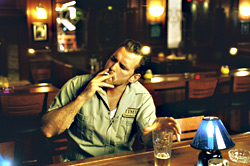Restraint is a virtue, but it only gets you so far. Barfly, written in a romantically self-valorizing mode by Charles Bukowski, was not a restrained movie, and its central performance by Mickey Rourke—one of his best—was enjoyable precisely because he showed us Bukowski’s sodden exuberance, his expansiveness with booze and broads. You could quibble about his manners and hygiene, but this was a guy incapable of being stingy with his soul. He let you know where he stood and what he thought of you—even if those words led to a bar fight and teeth scattered in the gutter. Factotum, an adaptation of several Bukowski stories, takes a different approach. Here is the unknown writer sedulously scrawling on yellow notepads, obsessed with success, dependent on drink, more or less indifferent to women. He treats regular employment like the weather—sometimes it rains, sometimes it doesn’t, but he never carries an umbrella. That’s for stiffs. Henry Chinaski (Matt Dillon) has a credo, and it runs like this: “If you’re going to try, go all the way. Otherwise, don’t even start.” Which applies to prose and bourbon both, even if it carries you to the bottom. Fuck what other people think.
Leading with his lower jaw and protruding paunch, Dillon is nothing if not committed to this directive, and so is Norwegian director Bent Hamer (Kitchen Stories), whose sparse, deadpan style suits this more monastic side of the Bukowski myth. I say myth, because either you buy into his legend or you don’t. I’m in the latter camp—there are better writers, better alcoholics, better alcoholic writers. Bukowski (1920–1994) was notable for being an especially industrious member of that third group (he published some 45 books). Factotum doesn’t sensationalize Chinaski’s early unpublished days, before he (i.e., Bukowski) earned a cult readership, which I respect, though it doesn’t leave the movie much room to develop. Chinaski simply trudges a triangular route between bar, mailbox, and bar. He keeps writing and dropping off manuscripts, interrupting this cycle only to take up with one barfly (Lili Taylor, brave), then another (Marisa Tomei, solid), then go back to the first.
This haggard march measures a very small universe. Chinaski’s suburban visit to his parents permits a few cartoonish put-downs, and his encounters with the management class are no more subtle. He keeps espousing his solidarity with “the poor” like he’s their champion or something. Another asshole counting his pocket change at the mahogany rail is more like it, and Factotum is admirably unsentimental about this truth. Watching Dillon and Taylor wake, vomit, and start the day drinking again, there can be no illusions about the rigorous path this ascetic inebriate has chosen. Says Chinaski, “Amazing how grimly we hold on to our misery.” That desperate grasp—on the bottle, on the ballpoint—is amazing, yes, but the spectacle of it isn’t. Factotum may inspire future writers, but let’s hope not any more self-deluding, scribbling drunks. BRIAN MILLER








